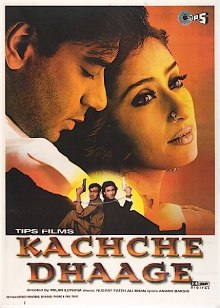


Nusrat Fateh Ali Khan (October 13, 1948 – August 16, 1997) was a musician from Pakistan, primarily a singer of Qawwali, the devotional music of the Sufis. He was featured in Time magazine's 2006 list of "Asian Heroes".
In 1971, after the death of Mubarak Ali Khan(Uncle), Nusrat became the official leader of the family Qawwali party and the party became known as Nusrat Fateh Ali Khan, Mujahid Mubarak Ali Khan & Party.
Khan's first public performance as the leader of the Qawwali party was at a studio recording broadcast as part of an annual music festival organised by Radio Pakistan, known as Jashn-e-Baharan.
His album Intoxicated Spirit was nominated for a Grammy award in 1997 for best traditional folk album.
Khan contributed songs to, and performed in, several Pakistani films. Shortly before his death, he recorded a song each for two Bollywood films, Aur Pyaar Ho Gaya (in which he also sang the song onscreen) and Kachche Dhaage.
He sang the title song of the film, Dhadkan. He also sang Saya bhi saath jab chhod jaye for Sunny Deol's movie, Dillagi. The song was released only in 1999, two years after Nusrat's death.
Khan contributed the song "Gurus of Peace" to the album Vande Mataram, composed by A.R. Rahman, and released to celebrate the 50th anniversary of India's independence. Rahman, who was a big fan of Khan could not do further songs with him. As a tribute, Rahman later released an album titled Gurus of Peace, which featured "Allah Hoo" by Nusrat. Rahman's 2007 song "Tere Bina" was also done as a tribute to Nusrat



According to the Guinness Book of World Records, Nusrat Fateh Ali Khan holds the world record for the largest recorded output by a Qawwali artist—a total of 125 albums as of 2001
Khan was taken ill with kidney and liver failure on August 11, 1997 in London, England while on the way to Los Angeles in order to receive a kidney transplant. He died of a sudden cardiac arrest at Cromwell Hospital, London, on Saturday, August 16, 1997, aged 48.[5][unreliable source?] His body was returned to Faisalabad, Pakistan and his funeral was attended by the public.
In 2005, Nusrat was awarded the "Legends" award at the UK Asian Music Awards
Many other artists have also cited Nusrat as an influence, such as A.R. Rahman, Sheila Chandra, and Alim Qasimov.
No comments:
Post a Comment